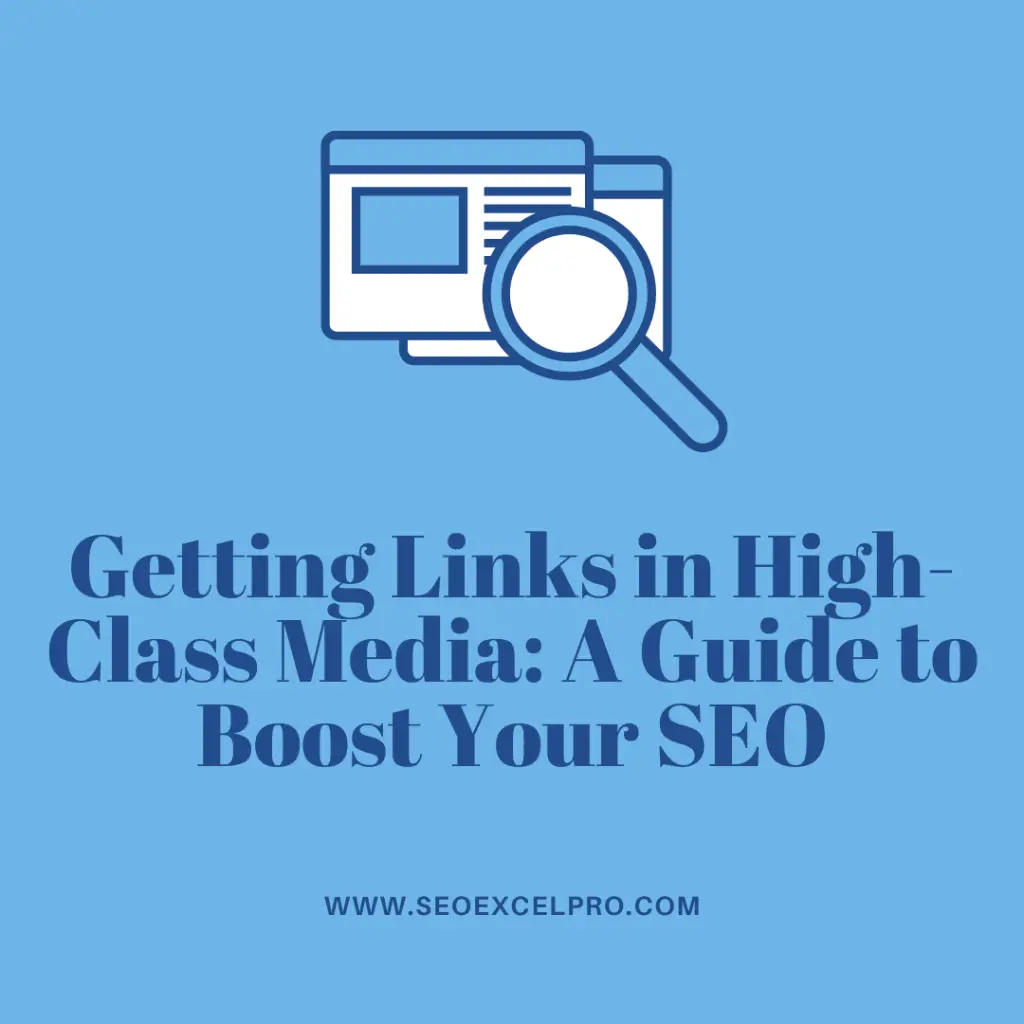Securing backlinks from high-class media outlets is one of the most effective strategies to improve your website’s SEO and authority. High-quality backlinks not only boost your search engine rankings but also enhance your brand’s credibility and visibility. Here’s a guide on how to get those valuable links from top-tier media.



1. Create High-Quality, Newsworthy Content
- Unique Insights: Journalists and media outlets look for original research, unique data, or expert opinions that can’t be found elsewhere. Conduct surveys, studies, or offer industry insights that provide value to their readers.
- Compelling Stories: Media outlets are more likely to link to content that tells a compelling story. Frame your expertise or data in a way that addresses current trends or solves pressing issues.
- Long-Form, Well-Researched Content: Create in-depth articles, whitepapers, or guides that showcase your authority. High-class media often link to these comprehensive resources as references.
2. Pitch to Journalists and Editors
- Personalized Outreach: Research the journalists or editors who cover your industry. Send them a personalized email with a clear value proposition, explaining why your content is relevant to their audience.
- Follow Editorial Guidelines: High-class media outlets have strict editorial standards. Ensure that your content or pitch meets their guidelines in terms of tone, format, and credibility.
- Offer Expert Commentary: Reach out to journalists when they’re writing about a topic you specialize in. Position yourself as a reliable expert who can provide quotes, data, or insights.
3. Leverage PR and Media Platforms
- HARO (Help a Reporter Out): HARO connects journalists with industry experts who can provide valuable insights for their stories. By responding to relevant queries, you can earn mentions and backlinks in reputable media.
- Press Releases: Well-written, newsworthy press releases distributed through PR platforms like PR Newswire or Business Wire can attract media attention and result in backlinks from authoritative sources.
4. Build Relationships with Journalists
- Networking: Engage with journalists on social media platforms like Twitter and LinkedIn. Share their articles, comment thoughtfully, and provide value to build long-term relationships.
- Become a Trusted Source: Offer useful insights without always expecting a backlink. Over time, if you’re consistently helpful and reliable, journalists will be more likely to link to your website in their articles.
5. Use Data-Driven Content
- Original Research and Statistics: High-class media outlets love to link to original research. If your business conducts surveys, research studies, or collects industry-specific data, package this information into an easy-to-reference report. Media outlets often link to such data to support their stories.
- Infographics and Visuals: Well-designed infographics that convey complex data in a visually appealing way can be highly shareable and link-worthy. Offer these to journalists who may find them useful for illustrating points in their articles.
6. Collaborate with Influencers and Thought Leaders
- Co-Authored Content: Collaborate with industry thought leaders to create high-quality content. Influencers with strong media connections can help push your content to the right outlets, potentially resulting in more media mentions and links.
- Guest Contributions: Write guest articles for high-authority platforms that are read by journalists. If your work is insightful and well-received, it could be picked up by mainstream media for wider distribution and linking.
7. Monitor and Capitalize on Trending Topics
- Newsjacking: Newsjacking involves injecting your brand into a trending news story in a relevant way. If you can quickly create content or provide expert commentary related to a current news event, media outlets may link to your content.
- Timely Content: Create content around holidays, events, or industry shifts. Media outlets often look for articles that tie into seasonal trends, providing an opportunity for you to get mentioned and linked.
8. Offer Exclusive Access
- Exclusive Interviews or Access to Tools: Give media outlets exclusive access to new tools, features, or insights before you launch them publicly. Journalists love breaking stories, and this can increase your chances of getting a backlink from top-tier media.
- Invite for Previews or Product Launches: If you’re launching a new product or service, offer media outlets a sneak peek or early access. This can result in not only links but also additional exposure.
9. Optimize for Shareability
- Social Proof: High-class media outlets often look for content that’s already gaining traction. Promote your content on social media platforms, blogs, and industry forums. If it’s already being shared and discussed, it’s more likely to attract media attention and backlinks.
- Encourage Sharing: Make it easy for readers and influencers to share your content by adding social share buttons and creating engaging visuals or snippets that can be easily quoted or referenced.
10. Track and Measure Your Success
- Use SEO Tools: Tools like Ahrefs, SEMrush, or Moz can help you track your backlinks and monitor where your links are coming from. This allows you to measure the impact of your media outreach and improve your strategy over time.
- Follow Up: If a media outlet mentions you but doesn’t link back to your website, reach out politely and request a link. This often works, especially when you provide valuable content.
By following these strategies, you can increase your chances of earning backlinks from high-class media outlets, which will strengthen your SEO efforts, boost your brand authority, and drive organic traffic.
